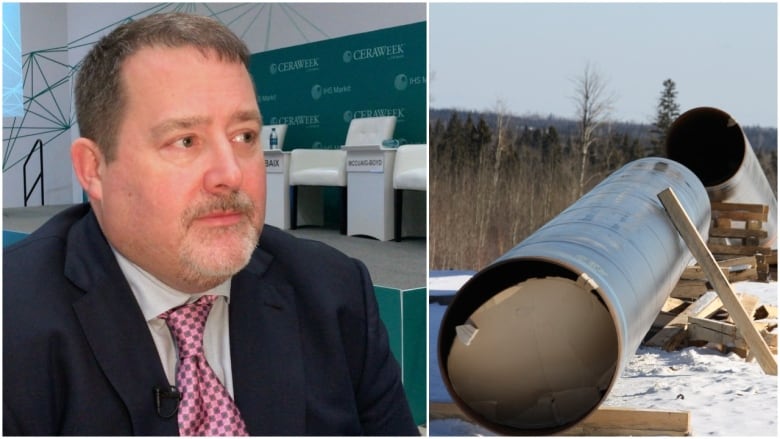Oilpatch makes pitch to investors, but can't hide pipeline woes
Canadian companies highlight innovation and tell investors to look past pipeline constraints

CEOs from hundreds of energy companies are in Houston for a major conference this week, and for the handful who get to speak on stage, it's a chance to make their pitch and sell their story directly to investors.
For chief executives of companies like Total and Saudi Aramco, they stress that they are low-cost producers.
For Canadian companies from Alberta's oilpatch, they take a different angle — stressing the innovative breakthroughs they are achieving to drive down expenses. While they want to talk technology, they can't avoid the overwhelming investor concern about export pipeline space. Existing infrastructure is full and proposed projects are stalled.
There's a limited amount of capital and lots of places looking to attract that capital.- Ryan Lance, CEO of ConocoPhillips
Investors are scared to sink big money into the oilsands knowing there is uncertainty over how the oil can reach the buyer.
"All of those investors are looking at it and saying, 'yes the resource is there, but show me you can do market access. Show me you can get that to market' and that's the big thing they are looking at," said Greg Stringham, an energy consultant and former vice-president of the Canadian Association of Petroleum Producers, in an interview at CERAWeek by IHS Markit.
"They really need to see that critical aspect of market access. Other than that, they would be right in on this," he said about oilsands investment.
- CBC at CERAWeek: Oilpatch can't match enthusiasm of U.S. industry
- Alberta invests in pipeline 'game changer' but $1B commitment needs to lure investors
On a side stage Tuesday morning that focused solely on Alberta's industry, both Cenovus and Seven Generations highlighted technological advances.
Alberta innovation
Seven Generation is able to use one well pad on a 22-acre site to drill 24 wells that can span 2,500 acres. The technique is cost effective and reduces the amount of disturbed land compared to traditional drilling.
Cenovus focused on its development of using solvents to extract bitumen in the oilsands. The research and development stage is over and the process is ready for commercialization.
Using solvents such as propane and butane is expected to reduce the amount of natural gas needed to heat up a bitumen deposit. The technology should cut costs and reduce greenhouse gas emissions (GHGs).
"It takes the GHG intensity of a barrel of oil produced by Cenovus to below the average GHG intensity of a barrel of oil produced in the U.S.," said CEO Alex Pourbaix while on stage at CERAWeek. "We view this as a real game changer and ultimately where we think the industry is going to go."
Alberta's pipeline problem came up during the panel discussion and Pourbaix used his last few minutes on stage to urge investors to look past it.
"I would just encourage investors and other stakeholders to look past the short-term issue [of pipelines] and really consider the incredible quality of the resource, the industry track record of innovation, track record of improving environmental performance," he said. "People just need to understand the incredible quality and opportunity that the resource presents."
Investment competition
Last year, Cenovus spent $17.7 billion to acquire most of ConocoPhillips' Canadian assets. In the months following the deal, Cenovus' stock price tumbled as investors were concerned about the price tag and the Calgary-based company's financials.
On the main stage on Tuesday, in front of thousands of people, the CEO of ConocoPhillips brought up the reason some companies and investors would rather spend their money in the United States, than in Alberta.
"There's a limited amount of capital and lots of places looking to attract that capital," said Ryan Lance, adding Alberta's government and Canadian companies "recognize the competitive landscape has changed."
This was a pretty important moment today at <a href="https://twitter.com/hashtag/CERAWeek?src=hash&ref_src=twsrc%5Etfw">#CERAWeek</a>.<br><br>ConocoPhillips CEO Ryan Lance brings up the Alberta oil industry's competitiveness problem. <a href="https://t.co/ynPvUSGWPF">pic.twitter.com/ynPvUSGWPF</a>
—@KyleBakxThe American oilpatch is booming, particularly in Texas, and it's an attractive investment because the returns are much quicker, compared to the oilsands.
There is a frenzy of activity in the Permian Basin of Texas, which Timothy Dove, CEO of Texas-based Pioneer Natural Resources, called the "golden goose."
Amid the mass excitement about drilling in the U.S., Little tried to steer investors' enthusiasm toward Fort McMurray, by promoting the long life of oilsands projects, including Suncor's new Fort Hills project — which is expected to produce oil for the next 50 years.
People just need to understand the incredible quality and opportunity that the resource presents.- Alex Pourbaix, CEO of Cenovus
Pipelines that transport Alberta's oil to market are full and that's the main reason why oil produced in the province is selling for far less than prices in the United States.
Usually the price difference is around $10, but the gap has grown much larger since November. West Texas Intermediate, the North American benchmark, is trading above $60 US a barrel so far this month, while in Alberta, Western Canada Select is fetching about $36 US.
Pipeline projects stalled
Both Kinder Morgan Canada's Trans Mountain Expansion and TransCanada's Keystone XL proposed pipeline projects are stalled.
Pourbaix, a former TransCanada executive, said in an interview with CBC News that the industry and investors will have to wait a little longer for the new pipelines to be constructed.
"I expect that they are ultimately going to be built and in a situation where those are built, I think there's significant takeaway capacity for continued development of the oilsands," he said.
"It has taken a very long time. It has taken a very significant toll on the Canadian economy."
Canadian companies are looking for investors who are patient, but the Alberta oilpatch has to compete with the drilling frenzy in the United States and it's a bigger challenge without any new pipelines on the Canadian prairies.

